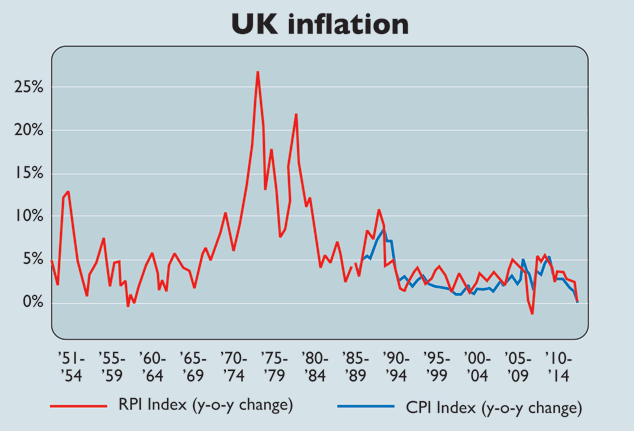Inflation drops to zero
Britain is on the cusp of deflation after prices failed to rise over the last year.

Get the latest financial news, insights and expert analysis from our award-winning MoneyWeek team, to help you understand what really matters when it comes to your finances.
You are now subscribed
Your newsletter sign-up was successful
Want to add more newsletters?

Twice daily
MoneyWeek
Get the latest financial news, insights and expert analysis from our award-winning MoneyWeek team, to help you understand what really matters when it comes to your finances.

Four times a week
Look After My Bills
Sign up to our free money-saving newsletter, filled with the latest news and expert advice to help you find the best tips and deals for managing your bills. Start saving today!

The Retail Price Index (RPI), which includes housing costs, is still above zero and last dipped into deflation in 2009 (see chart above). Lower food and petrol prices were behind the decline: they have fallen by 3.4% and 17% respectively over the past 12 months. Core inflation (which strips out food and energy prices) also weakened, from 1.4% to 1.2%.
What the commentators said
Some economists worry that deflation could become entrenched, leading to a Japan-style slump with sliding prices, wages and demand. "We should expect policymakers totake drastic action to prevent deflation taking root," said Fexco's David Lamb. "This is a code red moment."
But there's "no need... for a kneejerk reaction", said Andrew Clark in The Times. Wages are set to pick up, people's expectations of inflation look healthy and there's no evidence of stagnation. This suggests core inflation is unlikely to melt away.
MoneyWeek
Subscribe to MoneyWeek today and get your first six magazine issues absolutely FREE

Sign up to Money Morning
Don't miss the latest investment and personal finances news, market analysis, plus money-saving tips with our free twice-daily newsletter
Don't miss the latest investment and personal finances news, market analysis, plus money-saving tips with our free twice-daily newsletter
The classic worry when it comes to deflation is that people put off major purchases because they expect things to get cheaper, undermining demand, said Fraser Nelson on spectator.co.uk. But so far there is "zero evidence of this happening".
Indeed, as Citigroup points out, "the opposite is the case". Lower prices are encouraging spending. In February the share of people who thought it was a good time to make a major purchase rose to an eight-year high. The proportion of those who thought the next year could be good to do so is at a 12-year high.
What we have here is a "good form of deflation in which lower global food and energy prices provide a much needed boost to household real income levels", said PricewaterhouseCoopers'John Hawksworth. So "let's exhale, rather than panic", concluded Clark, "and enjoy a rare interlude of value in our shopping trolleys".
Get the latest financial news, insights and expert analysis from our award-winning MoneyWeek team, to help you understand what really matters when it comes to your finances.

-
 Should you buy an active ETF?
Should you buy an active ETF?ETFs are often mischaracterised as passive products, but they can be a convenient way to add active management to your portfolio
-
 Power up your pension before 5 April – easy ways to save before the tax year end
Power up your pension before 5 April – easy ways to save before the tax year endWith the end of the tax year looming, pension savers currently have a window to review and maximise what’s going into their retirement funds – we look at how